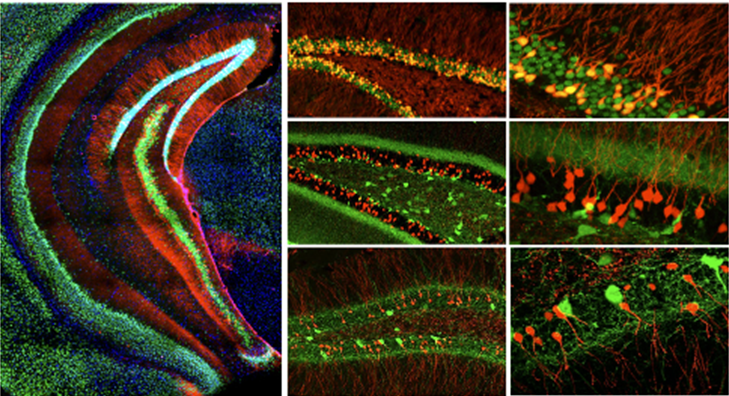Xin-Yun Lu, MD, PhD - Lab
Professor & Chair
Dept. of Neuroscience & Regenerative Medicine – MCG GRA Eminent Scholar Chair in Translational
Neuroscience
School of Graduate Studies
Mailing Address:
Dept. of Neuroscience & Regenerative Medicine
1120 15th Street, Rm. CA3006
Medical College of Georgia at Augusta University
Augusta, GA 30912
icon Phone: (706) 722-0550
icon Office: CA-3006
icon E-mail: xylu@augusta.edu

Education:
- 1993-1998 Ph.D. in Pharmacology, Washington State University, WA
- 1987-1990 M.Sc. in Biochemistry, Zhanjiang Medical College, China
- 1982-1987 M.D., Binzhou Medical College, China
Training:
- 1998-2001 Postdoctoral Fellowship, Mental Health Research Institute, Univ. of Michigan, Medical School, Ann Arbor, MI.
Research Interests
Chronic stress, neurodegeneration, depression, synaptic plasticity, behavior
Research in our lab is focused on understanding molecular, cellular and epigenetic mechanisms underlying the pathogenesis of neurodegenerative and neuropsychiatric disorders. Our on-going projects include 1) cellular mechanisms underlying chronic stress-accelerated brain aging and neurodegeneration; 2) histone modifications during aging and in Alzheimer’s disease (AD); 3) adipokine modulation of synaptic plasticity and cognitive behaviors; 4) role of inflammaging progression in neurodegeneration; and 5) hippocampal and hypothalamic neurons in stress response and adaptation.


Lab Members

Yuting Chen, PhD
- Postdoc

Maryam Malek, PhD
- Postdoctoral Fellow

Elina KC, PhD
- Postdoc

Scott Ventrello, PhD
- Postdoc

MD. Hossain, PhD
- Postdoc

Florika Patel, MSc
- Research Associate

Ning Wu, MiF
- Research Assistant

Shu Chen
- Research Technician

Kazi Rahman, MSc
- Senior Research Assistant

Jayvon Nougaisse
- MD/PhD Student

Amin Karimi
- PhD Student

Sankeerth Kanumuri
- PhD Student

Bodhana Veeramachaneni
- MSc Student

Becca McDonald
- Neurosci Undergrad Student

Cole Dorminey
- Biology Undergrad Student

Tanvi Pasumarti
- Neurosci Undergrad Student

Sriya Rajanala
- BS.MD Student
Open Positions in the Lab
We are currently welcoming postdoctoral fellows, graduate students and undergraduate students to join our laboratory.
Postdoctoral Fellows
We seek postdoctoral fellows interested in studying Alzheimer’s disease, inflammaging, stress neurobiology, and depression. Candidates are expected to have good communication skills and have a strong drive for building a successful research career.
Graduate Students
We welcome graduate students and are interested in potential rotation students. Prospective students can apply to our lab through the Graduate Program in Neuroscience as well as through the MD/PhD Program.
Undergraduate Students
We accept motivated undergraduate students who are interested in biomedical research.
Recent Publications
- Lei Y, Chen Y, Guo M, Patel F, Bai Y, Goo B, Du Q, Weintraub NL, Lu XY. Neuronal HDAC9: A key regulator of cognitive and synaptic aging, rescuing Alzheimer's disease-related phenotypes. BioRxiv 2025. doi:https://doi.org/10.1101/2025.09.13.675847
- Lei Y, Nougaisse J, Malek M, Mishu M, Bai Y, Denney K, Du Q, Stranahan A, Garza JC, Lu XY (2025). Chronic social isolation-unpredictable stress induces early-onset cognitive deficits and exacerbates Aβ accumulation in the 5xFAD mouse model of Alzheimer’s disease. Molecular Psychiatry. PMID: 40467855. DOI: 10.1038/s41380-025-03067-0.
- Veerapaneni P, Goo B, Ahmadieh S, Shi H, Kim DS, Ogbi M, Cave S, Chouhaita R, Cyriac N, Fulton DJ, Verin AD, Chen W, Lei Y, Lu XY, Kim HW, Weintraub NL (2024). Transgenic overexpression of HDAC9 promotes adipocyte hypertrophy, insulin resistance and hepatic steatosis in aging mice. Biomolecules. 2024 Apr 18;14(4):494. doi: 10.3390/biom14040494.
- Gharpure M, Vyavahare S, Ahluwalia P, Gupta SK, Lee TJ, Lohakare J, Kolhe R; Lei Y, Deak F, Lu XY, Isales CM, Fulzele S (2024). Alterations in Alzheimer's disease microglia transcriptome might be involved in bone pathophysiology. Neurobiology of Disease. 2024 Feb:191:106404.doi:10.1016/j.nbd.2024.106404.
- Ahmadieh S, Goo B, Zarzour A, Kim D, Shi H, Veerapaneni P, Chouhaita R, Yiew NKH,
Gonzalez CD, Chakravartty A, Pennoyer J, Hassan N, Benson TW, Ogbi M, Fulton DJ, Lee
R, Rice RD, Hilton LR, Lei Y, Lu XY, Chen W, Kim HW, Weintraub NL (2024). Impact of housing temperature on adipose tissue
HDAC9 expression and adipogenic differentiation in high fat fed mice. Obesity. 2024
Jan;32(1):107-119. doi: 10.1002/oby.23924.
- Shi X, Ding K, Rosario R, Ajith A, Su Y, Shaw S, Lawrence MM, Lu XY, Horuzsko A, Isales CM (2024). Effects of Systemic PPARγ Inhibition on Bone and Immune Cells in Aged Female Mice. J Gerontol A Biol Sci Med Sci. 2024 Feb 1;79(2):glad247. doi: 10.1093/gerona/glad247
- Kumro J, Tripathi A, Lei Y, Sword J, Callahan P, Terry A, Lu XY, Kirov S, Pillai A, Blake DT (2023). Chronic basal forebrain activation improves spatial memory, boosts neurotrophin receptor expression, and lowers BACE1 and Aβ42 levels in the cerebral cortex in mice. Cereb Cortex. 2023 Jun 8;33(12):7627-7641. doi: 10.1093/cercor/bhad066.
- Xiang G, Liu X, Wang J, Lu S, Yu M, Zhang Y, Sun B, Huang B, Lu XY, Li X, Zhang D (2023). Peroxisome proliferator-activated receptor-α activation facilitates contextual fear extinction and modulates intrinsic excitability of dentate gyrus neurons. Transl Psychiatry. 2023 Jun 15;13(1):206. doi: 10.1038/s41398-023-02496-1.
- Fang X, Chen Y, Wang J, Zhang Z, Bai Y, Denney K, Gan L, Guo M, Weintraub NL, Lei Y, Lu XY (2023). Increased intrinsic and synaptic excitability of hypothalamic POMC neurons underlies chronic stress-induced behavioral deficits. Molecular Psychiatry 28(3):1365–1382. Published: 06 December 2022. doi: 10.1038/s41380-022-01872-5.
- Stranahan AM, Guo DH, Yamamoto M, Hernandez CM, Khodadadi H, Baban B, Zhi W, Lei Y, Lu XY, Ding K, Isales CM. (2023) Sex differences in adipose tissue distribution determine susceptibility to neuroinflammation in mice with dietary obesity. Diabetes 72(2):245-260. Published: 11 November 2022. doi: 10.2337/db22-0192.
- Saggu S, Chen Y, Wang H, Cottingham C, Zhang S, Augelli-Szafran C, Jiao K, Lu XY and Wang Q (2023). Activation of a novel α2AAR-spinophilin-cofilin axis determines the effect of α2 adrenergic drugs on fear memory reconsolidation. Molecular Psychiatry 28(2): 588–600 2022. Published: 10 November 2022. doi: 10.1038/s41380-022-01851-w.
- Lei Y, Wang D, Bai Y, Nougaisse J, Weintraub NL, Guo M, Lu XY (2022). Leptin enhances social motivation and reverses chronic unpredictable stress-induced social anhedonia during adolescence. Molecular Psychiatry 27(12):4948-4958. Published: 22 September 2022. doi: 10.1038/s41380-022-01778-2.
- Kim J, Lei Y, Lu XY, and Kim CS (202). Glucocorticoid-glucocorticoid receptor-HCN1 channels reduce neuronal excitability in dorsal hippocampal CA1 neurons. Molecular Psychiatry 27(10):4035-4049. Published: 5 July 2022. doi: 10.1038/s41380-022-01682-9. Online ahead of print.
- Miller B, McEvoy JP, McCall WV, Lu XY (2022). Lower adiponectin levels as a predictor of depressive symptoms in African-American males with schizophrenia. Schizophrenia Research. 2022 Nov 18;250:134-136.
- Chin E, Ma Q, Ruan H, Chin C, Somasundaram A, Zhang C, Liu C, Lewis M, White MA, Smith T, Battersby M, Yao WD, Lu XY, Arap W, Licinio J, Wong ML (2022). The epigenetic reader PHF21B modulates social memory and synaptic plasticity-related genes in mice. JCI Insight. 2022 Jul 22;7(14): e158081. doi: 10.1172/jci.insight. 158081
- Goo B, Ahmadieh S, Zarzour A, Yiew NKH, Kim D, Shi H, Greenway J, Cave S, JNguyen J, Arbindi S, Wendolowski M, Veerapaneni P, Ogbi M, Chen W, Lei Y, Lu XY, Kim HW, Weintraub NL. Sex-dependent role of adipose tissue HDAC9 in diet-induced obesity and metabolic dysfunction. Cells, 2022 Aug 30;11(17):2698. doi: 10.3390/cells11172698.
- Fang X, Jiang S, Wang J, Bai Y, Kim CS, Blake DT, Weintraub NL, Lei Y, Lu XY (2022). Chronic unpredictable stress induces depression-related behaviors via suppressing AgRP neuron activity. Molecular Psychiatry. 26(6): 2299-2315. doi: 10.1038/s41380-020-01004-x. Epub 2021 Jan 11. Selected as a "SPOTLIGHT" article by Trends in Neurosciences.
- Kim NS, Wen Z, Liu J, Zhou Y, Guo Z, Xu C, Lin YT, Yoon KJ, Park J, Cho M, Kim M, Wang X, Yu H, Salamuru S, Christian KM, Hsu KS, Xia M, Li W, Ross CA, Margolis RL, Lu XY#, Song H#, Ming GL# (2021). Pharmacological rescue in patient iPSC and mouse models with a rare DISC1 mutation. Nature Communications. 2021 Mar 3;12(1):1398. doi: 10.1038/s41467-021-21713-3. #co-corresponding authors
- Wong ML, Arcos-Burgos M, Liu S, Licinio AW, Yu C, Chin EWM, Yao WD, Lu XY, Bornstein SR, Licinio J (2021) Rare Functional Variants Associated with Antidepressant Remission in Mexican-Americans: Short title: Antidepressant remission and pharmacogenetics in Mexican-Americans. Journal of Affective Disorders. 279:491-500. doi: 10.1016/j.jad.2020.10.027. Epub 2020 Oct 17.
- Li C, Meng F, Lei Y, Liu J, Liu J, Zhang J, Liu F, Liu C, Guo M, Lu XY (2020). Leptin regulates exon-specific transcription of the Bdnf gene via epigenetic modifications mediated by an AKT/p300 HAT cascade.Molecular Psychiatry. 26(8):3701-3722. doi: 10.1038/s41380-020-00922-0. Epub 2020 Oct 26
- Li C, Meng F, Garza JC, Liu J, Lei Y, Kirov S, Guo M, Lu XY (2021). Modulation of depression-related behaviors by adiponectin AdipoR1 receptors in 5-HT neurons. Molecular Psychiatry. 26(8):4205-4220. doi: 10.1038/s41380-020-0649-0. Epub 2020 Jan 24
- Lei Y, Wang J, Wang D, Li C, Liu B, Fang X, You J, Guo M, Lu XY (2020). SIRT1 in forebrain excitatory neurons produces sexually dimorphic effects on depression-related behaviors and modulates neuronal excitability and synaptic transmission in the medial prefrontal cortex. Molecular Psychiatry. 25:1094-1111. doi: 10.1038/s41380-019-0352-1. Epub 2019 Jan 31
- Yiew NKH, Greenway C, Zarzour A, Ahmadieh S, Goo B, Kim D, Benson TW, Ogbi M, Tang YL, Chen W, Stepp D, Patel V, Hilton R, Lu XY, Hui DY, Kim HW, Weintraub NL (2019). Enhancer of zeste homolog 2 (EZH2) regulates adipocyte lipid metabolism independent of adipogenic differentiation: Role of apolipoprotein E. Journal of Biological Chemistry. 294(21):8577-8591.
- Sun F, Lei Y, You J, Li C, Sun L, Garza J, Zhang D, Guo M, Scherer P, Lodge D, Lu XY (2019). Adiponectin modulates ventral tegmental area dopamine neuron activity and anxiety-related behavior through AdipoR1. Molecular Psychiatry, 24(1):126-144.